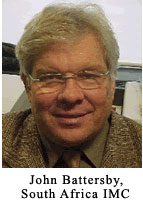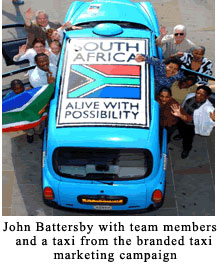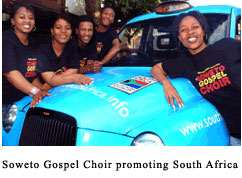 ReConnect Africa is a unique website and online magazine for the African professional in the Diaspora. Packed with
essential information about careers, business and jobs, ReConnect Africa keeps you connected to the best of Africa.
ReConnect Africa is a unique website and online magazine for the African professional in the Diaspora. Packed with
essential information about careers, business and jobs, ReConnect Africa keeps you connected to the best of Africa.


Branding South Africa - The role of the IMC
South Africa has taken the lead in tackling negative perceptions about Africa with a strong branding campaign targeted both internally and externally. The International Marketing Council (IMC) of South Africa has the primary role of encouraging business and investment in South Africa by helping to project a positive and dynamic image of the country and by providing reliable and accurate information about the country and its people, infrastructure, incentives and business environment.
We speak to John Battersby, UK Country Manager of the IMC about their branding campaign for South Africa.
 ID: What are the key challenges you face in respect of the developed world's perception of investing in Africa, in general, and in South Africa, in particular?
ID: What are the key challenges you face in respect of the developed world's perception of investing in Africa, in general, and in South Africa, in particular?
JB: The key challenges faced in relation to potential investment in Africa is the phenomenon of Afro-pessimism which is based on stereotypes and pre-conceived notions of Africa as a continent plagued by military coups, ethnic conflict, famine, disease and under-development. The Afro-pessimists can't see beyond the continent's challenges and tend to dismiss the revival structures and efforts as "too little, too late". Potential investors also have genuine fears about infrastructure, capacity, economic transparency and political governance, delivery, reliability, currency and regulatory restrictions on trade and investment.
We also receive enquiries about exchange controls, labour laws, black economic empowerment and how it impacts on investors and whether there are time limits on BEE and limits on the desired percentage of black ownership in empowerment deals.
ID: Branding Africa positively is a challenge that cuts right across the continent. What are some of the approaches that you have adopted in the IMC to successfully brand South Africa?
JB: The IMC took the approach of developing a comprehensive national brand which rolls together all South Africa's unique and leading qualities: the diversity of its people, the dynamic and visceral nature of its cultures, the warmth and generosity of spirit of its peoples, the physical beauty, the nature of the historic compromise to democracy, the ability to negotiate over problems with inclusivity as the guiding principle, the ability to solve problems etc. These qualities are reflected in the IMC's pay-off line: South Africa, Alive with Possibility and in the Tourism Brand: Making the Impossible, Possible, or Trade and Investment South Africa's: Business Unlimited.
 The first step in promoting the brand was to get buy-in from SA stakeholders. IMC CEO Yvonne Johnston has personally briefed some 15,000 SA businesses, government and other bodies on the brand.
The first step in promoting the brand was to get buy-in from SA stakeholders. IMC CEO Yvonne Johnston has personally briefed some 15,000 SA businesses, government and other bodies on the brand.
The IMC has also developed two major video/DVD presentations on the brand and has played a central role in promoting the brand through partnering with like-minded organisations such as "The Good News" books, Proudly South African, Trade and Industry South Africa (Tisa) and SA Tourism. It also plays a pro-active role in promoting positive news about South Africa and the brand by highlighting the achievements in its IMC website and the www.southafrica.info website which is now the major portal into the country and scored more than a million hits for the first time this week.
ID: Attracting inward investment is one thing, managing investments to provide a return is another. What are some of the initiatives that are being taken up to ensure that South Africa has the necessary, skills, technology and know-how to really deliver what investors are looking for?
JB: Training and skills are a major pre-occupation of both government and the private sector, which contributes 1% of profits in the form of a special training levy to further training. The Government, through the Department of Labour, has a comprehensive scheme to advance the training of employees. The government's program of broad-based black economic empowerment has also identified training as one of the key criteria for assessing a company's transformation or empowerment scorecard as well as equity, black directors, black managers, procurement policies and employee share participation schemes. The system of sectoral charters - social contracts between government and various sectors of the economy to achieve BEE goals - also place major emphasis on training, skills, technology and know-how. The national and provincial education departments also have a policy of actively promoting science and mathematics as school subjects and government is looking at upgrading science and technology facilities at schools.
There is still a shortage of skills in the economy and government is looking at various means of speeding up skills training as well as hiring non-resident South Africans and foreigners in areas where training will take some time. Concerns around BEE are addressed by underscoring the message that the country's long-term economic and political stability rely on an equitable distribution of the country's economic wealth and power and ensuring that all South Africans have a stake in the economy, however small. The message is bolstered by buy-in from South African business executives and the knock-on effect this has with potential foreign investors.
ID: Can you explain some of the key elements of the IMC’s role in branding South Africa?
JB: A key component of that image is South Africa as a leading African nation and one that is actively trying to promote the concept of an African economic, social and political revival through the African Union (AU), the New Partnership for Africa's Development (Nepad) and the AU's African Peer Review Mechanism (APRM).
SA is also promoted as a springboard for trade and investment with Africa. The image is addressed in many different ways including interaction with the media, above and below-the-line marketing campaigns such as the branded taxis and supporting corporate sponsorship of SA-centric events and promoting joint branding events.
We also build South Africa's image by promoting its role as the leading investor in Africa, partnering with SA Tourism to highlight the country's potential as a leading tourist destination for Africa and the world. We also continually highlight the country's achievements at international sporting and cultural fora such as the Olympics, World Cup soccer etc.
The IMC also has a media nerve centre in Pretoria, known as the Communications Resource Centre, from where it monitors domestic and global media coverage of South Africa and makes appropriate interventions to support the brand. Internationally, SA cities and provinces twin with counterparts abroad as part of a mutual promotion campaign. (e.g. London and Johannesburg)
ID: How do you at the IMC address the issue of the risks that are commonly associated with dealing with Africa - whether economic, reputational, political, etc.?
JB: The IMC deals with the risks associated with Africa by stressing the great strides that have been made in recent years under Nepad and the AU with respect to conflict resolution, economic transparency, political governance, trade reforms etc. Nepad provides the basis for a development partnership between Africa and the industrialised countries. South African President Thabo Mbeki and his government devote much of their time and resources to conflict resolution and laying the foundation for accelerated development in Africa.
 ID: How do you gauge the success of the IMC in its role of bringing positive representation of South Africa both within Africa and externally?
ID: How do you gauge the success of the IMC in its role of bringing positive representation of South Africa both within Africa and externally?
JB: It is not easy to gauge the success of the IMC other than through anecdotal evidence and, ultimately, through increased trade and tourism and, in particular, foreign direct investment. The best evidence that the IMC has made an impact is evident in the increased mood of optimism and pride which has made its presence tangible in the year of the country's 10th anniversary of democracy, its third democratic elections and its triumph in being awarded the 2010 soccer world cup. Feedback from the IMC and www.southafrica.info websites also indicate that the IMC and related bodies involved in promoting the country's image have made great strides both domestically and internationally.
ID: What are some of the lessons that other African countries can learn from the work and experience of the IMC of South Africa?
JB: Other African countries can learn from the example of the IMC and South Africa because it is not easy to focus on what appears like a luxury - marketing and branding - when you are dealing with the basics of survival, under-development and conflict resolution, as is the lot of many African countries.
Hopefully, the South African example will illustrate the medium and long-term benefits that flow from a comprehensive approach to - and sustained implementation of - a country branding exercise such as the one followed by the IMC. It should also be pointed out that despite South Africa's economic and infrastructural head-start on many African countries; it has a lot to learn from the rest of Africa in relation to values and social issues which have been severely disrupted by the apartheid experience.
